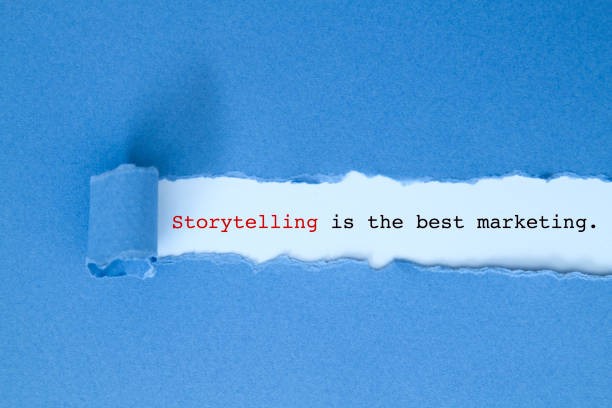Storytelling in digital marketing, “Story, story, story.” If you live in Nigeria, chances are you grew up hearing that phrase. And every time it was said, you instinctively prepared yourself to listen, knowing you were about to be taken on a journey.
Stories sell. A good story converts, and a great story can turn a customer into a loyal, lifelong advocate. But why do stories sell? Why do we anticipate that journey the moment we hear those familiar words?
The answer is simple: stories captivate because they build suspense. The listener doesn’t know what to expect but is eager to be entertained or enlightened, while also subconsciously connecting with the characters or events in the narrative.
People love stories because they offer an escape into a different reality, allowing them to enter a new world, feel a range of emotions, and share experiences that may not be their own. This creates an emotional bond between the storyteller and the audience, inviting empathy and understanding.
Marketing is, at its core, a form of storytelling, where the business, brand, or customers take the role of the characters, navigating through challenges and finding solutions.
Digital marketing brings this storytelling to an even broader audience by harnessing the power of the internet.
So, how can storytelling in digital marketing be used to connect with Nigerian consumers on an emotional level?

Know the culture of your target audience
To connect with Nigerian consumers, understanding the deep cultural significance of storytelling is key. In Nigeria, stories aren’t just entertainment, they are a means of preserving history, passing down wisdom, and fostering community.
From the folktales told by elders to the modern narratives shared on social media, Nigerians have always been drawn to stories that reflect their reality, aspirations, and struggles. Digital marketers can tap into this cultural affinity by crafting culturally relevant narratives.
For instance, using familiar settings, local idioms, and characters that resonate with the average Nigerian consumer helps create a stronger emotional connection. Whether it’s through advertising campaigns, social media posts, or email newsletters, incorporating elements of Nigerian culture makes the story feel authentic and relatable.
Approach customer pain points using stories
One of the most effective ways to engage Nigerian consumers is by addressing their pain points through storytelling. In a market where consumers are increasingly discerning and price-conscious, digital marketing must go beyond simply showcasing products or services.
It needs to tell a story and demonstrate empathy and understanding. By framing your brand as a solution to a specific problem, you tell a story that consumers can relate to on a personal level.
For example, consider the daily struggles of the average Nigerian consumer: electricity shortages, fluctuating fuel prices, or the complexities of navigating the digital economy. By presenting your brand as a solution to these challenges, you craft a narrative that speaks directly to their emotions.
A great example of this is the success of fintech companies like Paystack or Flutterwave, which tell stories of empowering Nigerian businesses in a challenging economic climate. Their marketing doesn’t just sell financial tools, it tells a story of overcoming obstacles and fostering growth in the Nigerian marketplace.
Humanize Your Brand
Can your target audience relate to your brand? In a world increasingly driven by technology, consumers crave genuine human connections.
Nigerian consumers, in particular, are drawn to brands that are personable and relatable. When brands humanize themselves through customer testimonials, behind-the-scenes content, or even humorous and engaging social media interactions, they become more than just businesses; they become trusted companions.
Storytelling offers a way to build that human connection. Whether it’s highlighting the journey of your employees, sharing success stories from satisfied customers, or even showing the growth of your brand in Nigeria’s unique environment, these narratives foster a sense of trust and loyalty.
The rise of influencer marketing in Nigeria also speaks to this desire for authenticity. Influencers, in many ways, are modern-day storytellers who bring brands to life in ways that traditional ads cannot.
They share real-life experiences, use humour, and showcase products in a personal, relatable context that appeals to their audience.
People trust the judgement of their friends and if your target customers see you as their friend, they will trust your brand.
Use Visuals
In a country as diverse as Nigeria, visual storytelling is just as important as the written word. Visuals are not limited by language barriers and communicate emotions clearly. Whether it’s through video content, infographics, or user-generated content, the use of visuals can significantly enhance a brand’s storytelling approach.
Platforms like Instagram, YouTube, and TikTok are popular among Nigerian consumers. Leveraging these platforms to tell visual stories, show real-life use cases, and showcase behind-the-scenes content, can lead to deeper emotional connections.
For example, a brand like Indomie has mastered the art of visual storytelling, using bright, family-centred content that evokes a sense of nostalgia and warmth.
Don’t just talk about your purpose, vision and mission, show them.
Nigerian consumers are increasingly looking for brands that stand for something beyond profit. They want to connect with companies that contribute positively to society, whether through social causes, environmental sustainability, or community building.
Storytelling that incorporates a brand’s purpose can be a powerful way to connect emotionally. For instance, brands that support education, healthcare, or job creation in Nigeria can tell stories that highlight their efforts to make a positive impact.
Sharing stories of the people and communities benefiting from your brand initiatives forges a deeper connection with consumers who share the same values.
Conclusion
In conclusion, storytelling in digital marketing offers a profound opportunity to connect with Nigerian consumers on a deeper emotional level.
By understanding the cultural nuances, addressing consumer pain points, humanizing the brand, and using both visual and purpose-driven narratives, brands can create lasting emotional bonds with their audience.
Stories resonate emotionally and stand out amidst the noise.


